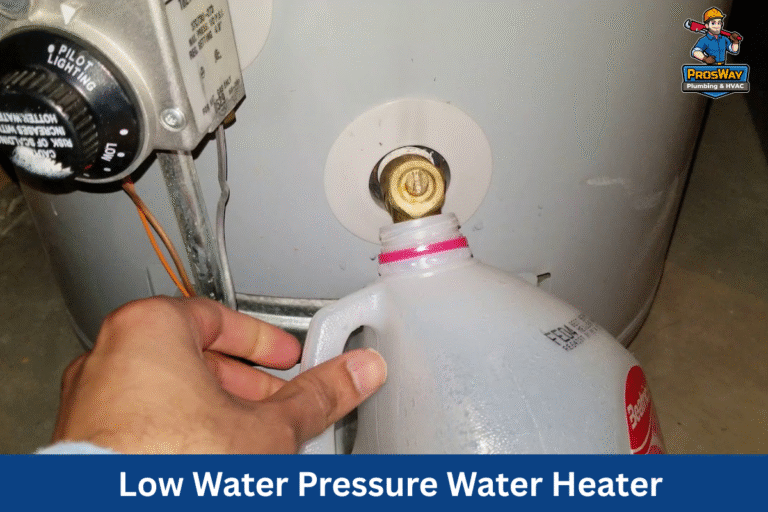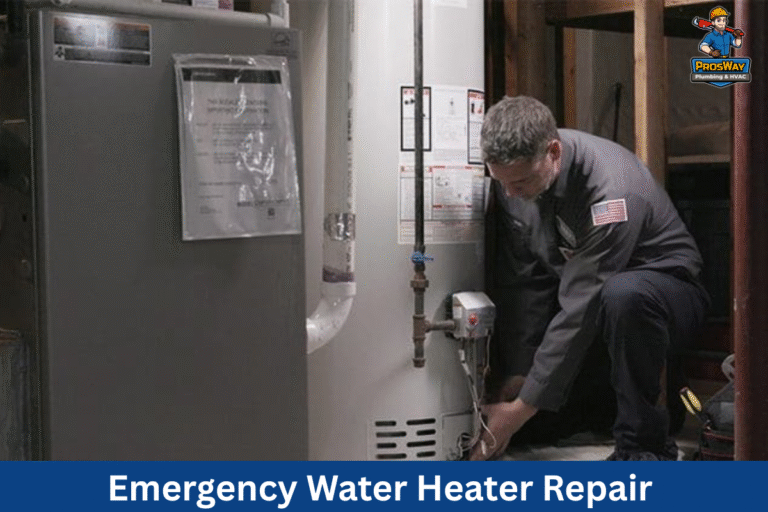Seeing brown water from a water heater can be alarming, especially when it pours out of the faucet where you expect clean, clear hot water. While discolored water is often not immediately dangerous, it’s a warning sign that something in your plumbing or water heating system needs attention. Most cases link back to sediment buildup, rust, or corrosion inside the water heater tank.
Regardless of the source, brown water should never be ignored, and do not drink it, utilize it until it’s clear. This guide outlines the most common causes, how to determine if the problem is inside your hot water heater or elsewhere, and the best steps to fix it. Y
Why Is My Water Brown? The Common Causes
Discolored water usually traces back to a handful of well-known issues. Some involve your water heater tank itself, while others may be tied to pipes or the local water supply. Here are the leading culprits:
1. Rust and Corrosion Inside the Water Heater Tank
Most tank water heaters are made of steel lined with a thin protective coating. Over time, heat, minerals, and pressure wear down the coating.
Once exposed, steel reacts with water and oxygen, creating rust. This rust mixes with hot water, causing the brown or reddish tint you see at faucets.
The process often accelerates as the anode rod inside the tank depletes. This rod is designed to attract corrosive minerals, protecting the tank walls. Without regular replacement, the tank itself becomes the target.
2. Sediment Buildup at the Bottom of the Tank
Hard water brings in minerals like calcium and magnesium that settle at the bottom of the tank as sediment. When the heater runs, water boils around this layer, breaking loose particles that travel through your hot water lines.
This sediment causes both discolored or cloudy water and reduces efficiency by forcing the heater to work harder. In extreme cases, it creates a rumbling or popping sound when steam bubbles push through the mineral layer.
3. Pipe Corrosion (Not Just the Water Heater)
Sometimes the source of brown water isn’t the heater but your plumbing. Older steel or iron pipes corrode over time, releasing flakes of rust.
Unlike tank rust, which usually affects only hot water, corroded pipes can cause discoloration in both hot and cold water. This is why checking multiple faucets is important to isolate the source.
4. Municipal Water Supply Issues
Occasionally, brown water has nothing to do with your home’s system. Local utilities sometimes flush hydrants or water mains to clear sediment, which temporarily pushes rust and iron into household supply lines.
In these cases, both hot and cold water appear brown for a short period but usually clear after running the tap for several minutes.
Is Brown Water Dangerous? Safety Considerations
While brown water from a hot water heater is unsettling, most discoloration comes from iron, manganese, or rust particles, which are not toxic in small amounts. Still, safety and usability concerns remain:
- Drinking water: Rusty water often tastes metallic and can carry iron bacteria, which produce reddish-brown slime. Water should not be consumed until the source is identified.
- Showering and laundry: Discolored hot water can leave stains on clothing, tubs, and fixtures. It may also irritate sensitive skin.
- Plumbing health: Persistent discoloration may signal serious corrosion or sediment buildup, both of which shorten the heater’s lifespan and increase the risk of leaks.
A key step is determining if the issue is limited to your hot water heater or part of a larger plumbing system or supply problem. That’s where a simple faucet test comes in.
How to Tell If It’s Your Water Heater or Pipes?

You don’t need specialized tools to start diagnosing the source of brown water. A few quick checks can narrow down the problem:
- Run only cold water. If the cold tap runs clear, the issue likely sits inside your hot water heater.
- Run only hot water. Brown water appearing only here strongly suggests sediment or corrosion inside the tank.
- Check multiple faucets. The problem could be municipal supply disturbances or deteriorating pipes if both hot and cold water are brown throughout the house.
- Look for consistency. Temporary brown water after utility work often clears in hours, while persistent discoloration signals an internal plumbing or tank issue
This simple test helps you decide even if flushing the water heater may solve the problem or if larger plumbing repairs are needed.
How to Fix Brown Water From Your Water Heater?
Once you’ve confirmed that the discoloration comes from the water heater, several fixes can restore clear hot water. Some are short-term solutions, while others address the root cause.
1. Flush the Water Heater Tank
Sediment buildup is one of the most common reasons for brown water. Flushing the tank once a year helps clear calcium, magnesium, and iron deposits.
Steps for flushing:
- Turn off the power (breaker for electric, gas valve for gas units).
- Close the cold water supply valve.
- Connect a garden hose to the drain valve at the base of the tank and direct it to a floor drain or bucket.
- Open the drain valve and a nearby hot water tap to let air in, which speeds draining.
- After draining, briefly open the cold supply valve to stir and flush out remaining sediment.
- Close everything, refill the tank, and restore power or gas.
The tank may have deeper corrosion if flushing clears the water, but the problem returns quickly.
2. Check and Replace the Anode Rod
Inside every tank water heater is a sacrificial anode rod, usually made of magnesium or aluminum. Its job is to attract corrosive minerals and protect the steel tank walls. Over time, the rod dissolves. Without it, the tank rusts rapidly, leading to brown water.
Replacing the anode rod every 3–5 years can extend the life of the water heater by preventing premature corrosion.
3. Short-Term Fixes vs. Long-Term Solutions
Flushing and replacing an anode rod often helps, but they aren’t always a permanent solution. Once rust or corrosion spreads into the inner tank lining, no repair will fully restore water quality. At this stage, replacement becomes the only reliable option.
When Replacement Becomes the Only Solution
A water heater nearing 10–12 years of age that produces brown water consistently, even after flushing, is usually at the end of its service life. Signs include:
- Persistent discoloration despite maintenance.
- Rust stains on sinks or laundry.
- Leaks around seams or fittings.
A new water heater restores clear water, improves efficiency, and reduces the risk of sudden tank failure.
When to Call a Professional Plumber?

Not every homeowner has the tools or time to drain a tank or replace an anode rod. More importantly, brown water can sometimes point to problems beyond the heater itself.
Call a licensed plumber when:
- The water heater is 8–12+ years old.
- Flushing doesn’t resolve the discoloration.
- You notice strange odors like rotten eggs, which may signal hydrogen sulfide or iron bacteria.
- There are visible leaks or corrosion on the tank body.
- Both hot and cold water appear brown throughout the house (a sign of pipe corrosion or municipal water issues).
A professional can determine if the issue is confined to the hot water heater, related to old steel pipes, or part of the municipal water supply. They’ll also recommend whether a repair, filtration system, or replacement is the best path forward.
Preventive Measures: How to Keep Your Water Clear
Brown water problems often come down to neglect. A little regular maintenance keeps hot water clear and extends the life of your system.
- Annual Flushing: Draining the tank once a year removes sediment and mineral buildup. This prevents scale from hardening at the bottom, reducing the risk of rusty water and strange noises.
- Install a Water Softener: In areas with hard water, calcium and magnesium quickly coat the tank walls and heating elements. A water softener or whole-house scale filter protects against excessive buildup.
- Monitor the Age of Your Water Heater: Most water heaters last 10–12 years. Once rust and corrosion set in, even flushing won’t clear brown water. Replacing before failure avoids water damage and emergency costs.
- Schedule Professional Inspections: A licensed plumber can check valves, fittings, and the tank lining during annual inspections. They also test for leaks, corrosion, and pressure issues, problems homeowners often miss.
Conclusion
Discolored water is more than an inconvenience; it’s often a signal that your plumbing system or water heater needs attention. Sediment, rust, or pipe corrosion can all play a role, but with regular maintenance and timely service, you can keep your home’s hot water safe and reliable. Addressing the issue early helps prevent costly repairs and ensures peace of mind.
Don’t let discolored water disrupt your home!
Why put up with murky or unreliable hot water? ProsWay Plumbing & HVAC provides expert inspections, tank flushing, anode rod replacement, and full water heater installation across Northern New Jersey. So, Call us now at (862) 260-5870 or Book Online to restore clear, clean hot water and protect your home’s plumbing system.








